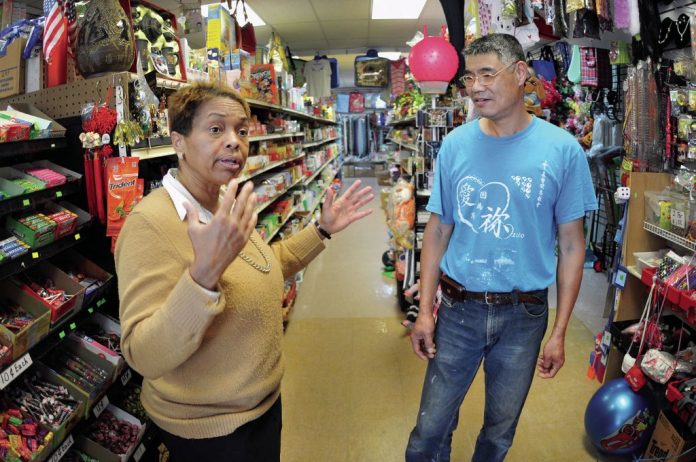Sandi King, with the Department of Commerce, speaks with buisiness owner Liu Tihn Chang about what his store needs to thrive safely, Friday, May 4, 2012, Philadelphia, Pa. (Maria Pouchnikova)
In many ways, the 6600 through 7000 blocks of Bustleton Ave. look like a retail shopping corridor straight out of the mid-to-late 20th century.
There are grocery stores, restaurants, Realtors, hair salons, insurance brokers, bakeries, a meat store, a pharmacy and a furniture store along the avenue among dozens of storefronts.
But the corridor is more contemporary, too. Chinese-language speakers and their families own about half of the businesses, while many others have ties to the Portuguese-, Arabic- and Spanish-speaking communities, as well as other Southeast Asian cultures.
English also is spoken there.
“ZIP code 19149 is like a global nation,” said Samuel Chueh, a business service manager for the city’s Commerce Department.
The population of the area echoes the demographics of the commercial corridor. The Commerce Department is trying to make the avenue a true community by facilitating a Bustleton Avenue Business Association. The good news is, most of the merchants already seem to agree on several key points.
They want better security, cleanliness and parking along the avenue, according to Sandi King, another Commerce Department business services manager.
King revealed those collective priorities during the new association’s first organizational meeting on May 1 at Northeast Regional Library. In the weeks leading up to the meeting, she and Chueh circulated surveys to each of about 40 businesses. More than 30 completed surveys were returned to the city officials.
More than a dozen businesses were represented at the inaugural meeting. Meanwhile, City Councilman Bobby Henon (D-6th dist.), 2nd Police District Officer Mark Mroz, sanitation enforcement officer Michelle McMillian and Chris Hess, a representative of the Community College of Philadelphia’s Small Business Center, highlighted public resources available to the merchants.
“In order to impact safety and security in the community, we have to come together,” said Curtis Gregory, director of the Commerce Department’s Office of Business Services. “At the end of the day, all this information is good for the people here, but it has to be spread to the (rest of the) community.”
Cleanliness, or the lack thereof, was a motivating factor for the new business association.
“The trigger was we received a lot of complaints (from merchants) that they received violations from the Streets Department, but they say they clean their sidewalks every day,” Chueh said.
Commerce officials figured that better communication might solve the lingering sanitation problem, along with other local concerns.
McMillian reported that she is one of about five sanitation officers in the area, but she does not issue violations arbitrarily. Litter infests sidewalks and driveways. Trash bins often are left uncontained and unsecured. Some trash from businesses even winds up on nearby residential properties, McMillian said.
“There’s a big litter condition right now up here,” she said.
Businesses should know how to sort and mark their trash and recyclables for pickup. They should know what days and times trash should be placed at the curb and when it should not. A clean appearance can only help businesses succeed.
“We’re here not just to write tickets, but to educate you to help you improve your business,” McMillian said.
Mroz said that networking can help merchants improve another area of concern, safety and security. As the community-relations officer in the 2nd district, Mroz is available to advise businesses on improving security. For example, merchants should avoid carrying large bundles of cash in public. The district offers escort services to merchants who must transport large sums to the bank.
Also, Mroz added, merchants are encouraged to look out for suspicious activity on the block or involving neighboring stores.
The police department has translators available to help those who don’t speak English.
Some prospective business association members acknowledged that many merchants may be reluctant to participate because of cultural factors.
“It may be the competition,” said Timothy Tam, a math professor at Community College of Philadelphia and board member of a local church, Chinese Christian Herald Crusade. “It is Chinese character, maybe they don’t express themselves openly too much if they don’t see immediate benefit.”
Others see the possible benefits.
“Everybody together would work better for safety and security,” said Alex Lee, an agent for Panphil Realty. “Safety is very important.”
Tam envisions more long-term benefits like the promotion of a consolidated business district. According to the 2010 census, there were more than 8,000 people of Chinese ethnicity living in the 19149, 19111 and 19152 ZIP codes, Tam said. By comparison, there were fewer than 5,000 living in the Chinatown vicinity downtown.
“They have good business in Chinatown, why not do it here?” Tam said.
The area also could use more Chinese professionals so that residents needn’t travel to Chinatown or New York for certain services and Bustleton Avenue could become more of a destination.
“Like Chinatown and other business districts, you don’t go to a place for one thing, you go for a lot of errands,” Tam said.
With support from the public sector, an association could have an impact in the short-term, but participation from the merchants has to be there. They must be willing to volunteer their time and put aside skepticism.
The next meeting is planned for Tuesday, June 5, from 2 to 4 p.m. at Northeast Regional Library, 2228 Cottman Ave. All are invited and encouraged to attend. For information, visit phila.gov/business or call 215–683–2100.
“We have to build trust by delivering what we say we can do,” King said. “And we can’t promise things we can’t deliver.” ••





